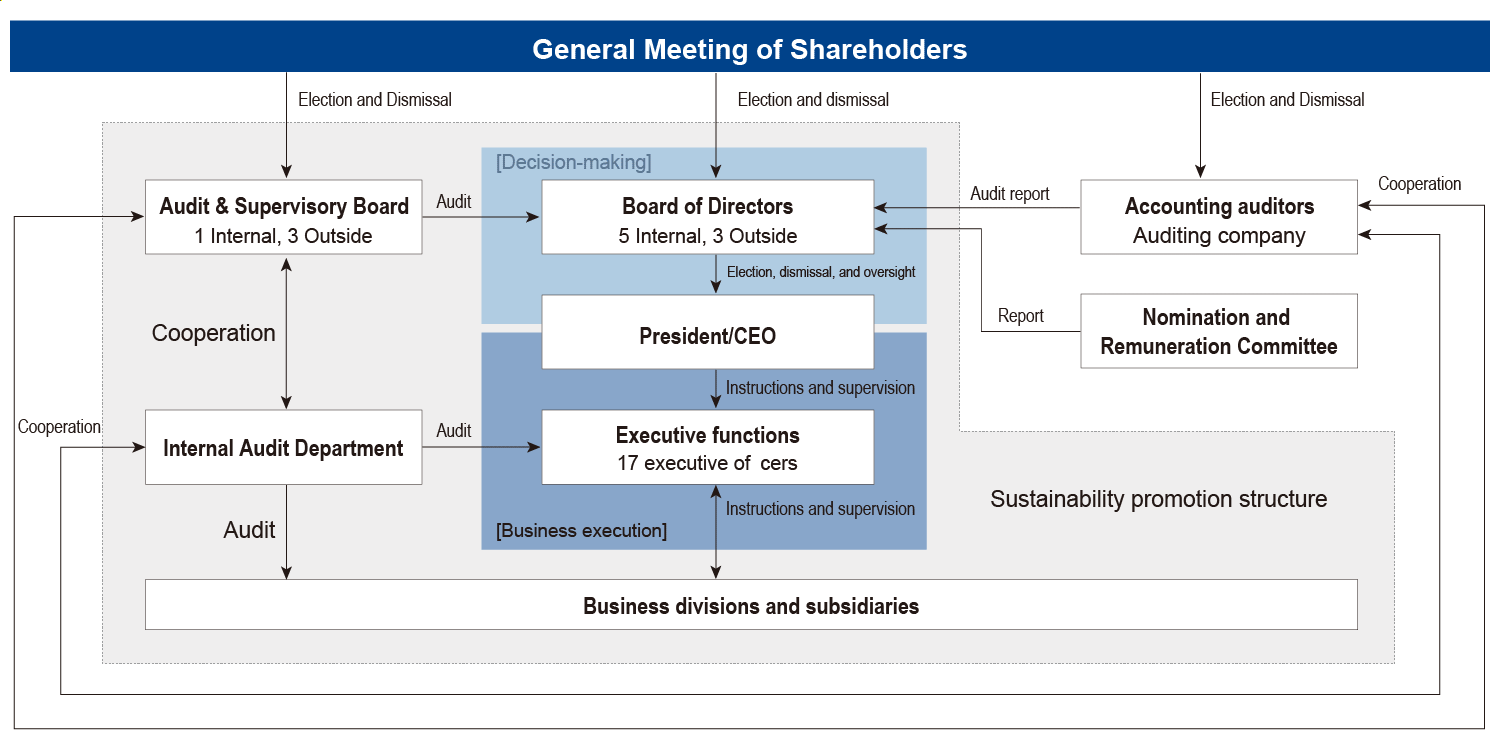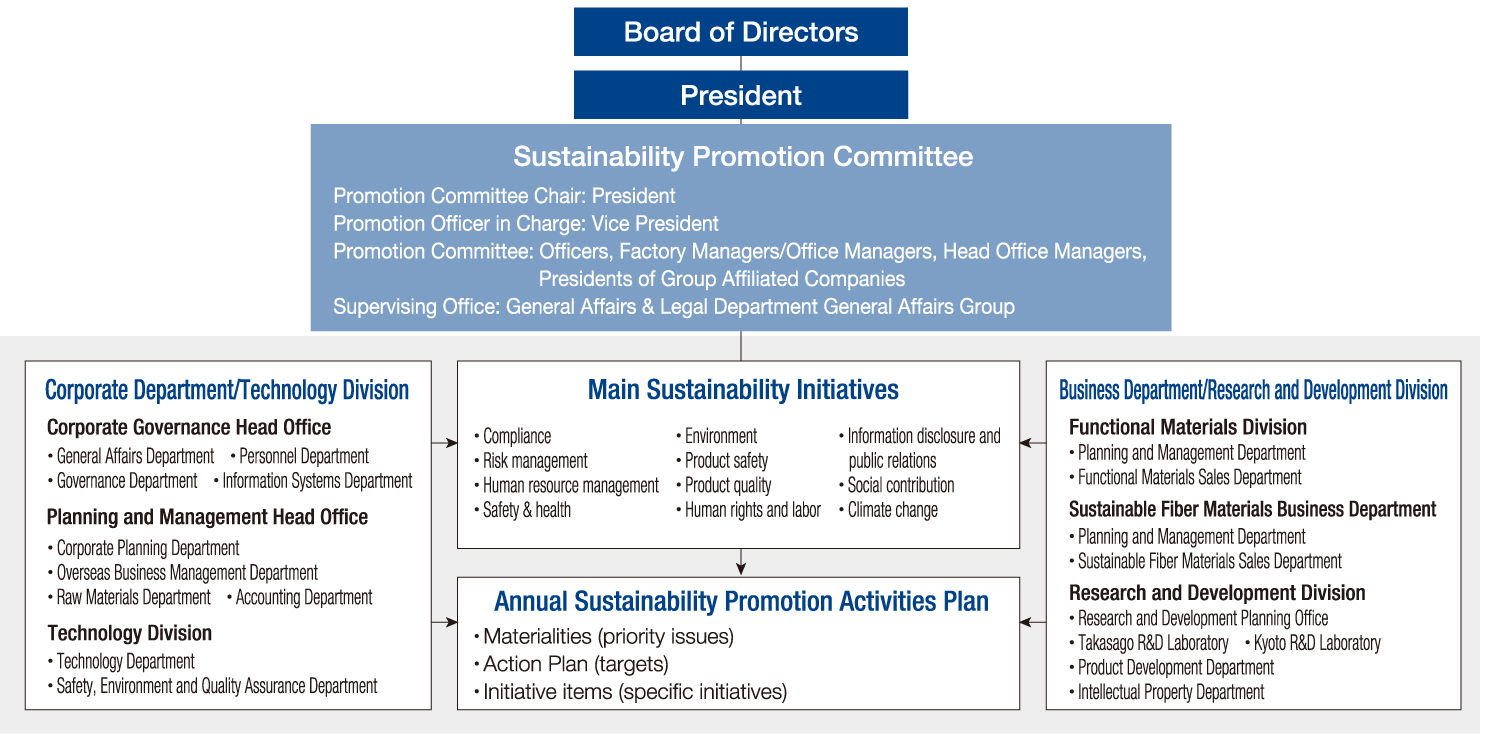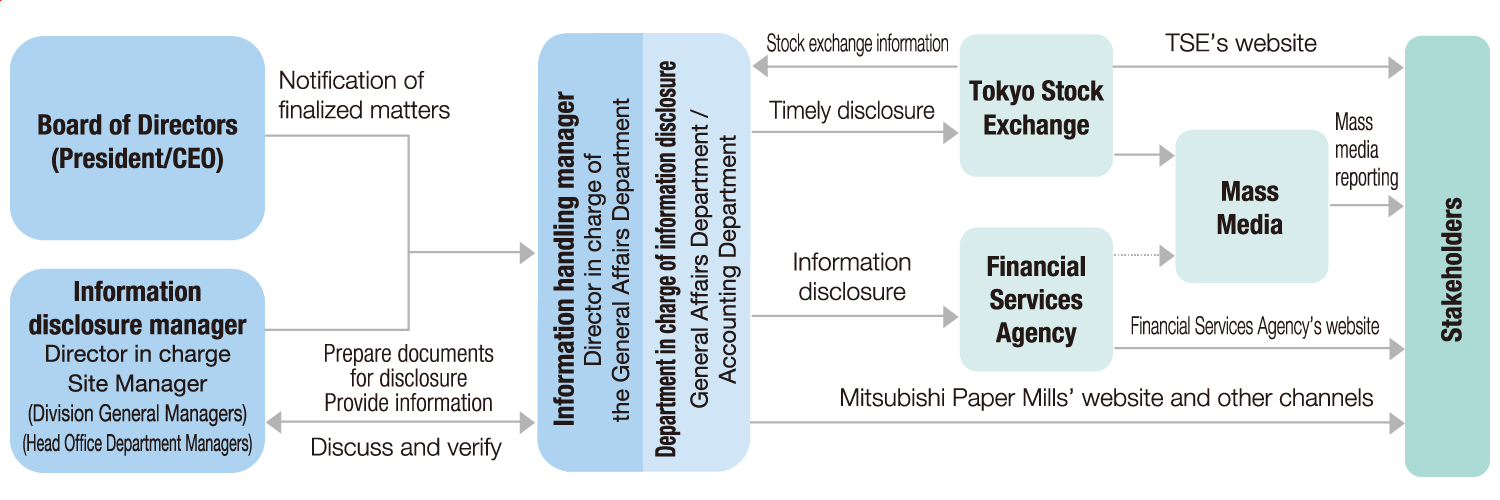About Us
Corporate Governance
Mitsubishi Paper Mills’ corporate activities are based on its corporate philosophy: “Live up to the trust of its customers in the world market”; “Always be on the leading edge of technology”; “and Contribute to preserving the global environment and creating a recycling-based society”. Based on this philosophy, the Group pursues corporate group management that values sustainable growth (sustainability) of our company and society, works to enhance management transparency, and boost corporate governance, all to achieve the sustainable growth of the Group and the medium- to long-term improvement of its corporate value.
Corporate Governance Framework
Our company has designated an independent company with an Audit & Supervisory Board as its organizational design. We have appointed three independent outside directors, accounting for more than one third of the Board of Directors, to create a system that allows the Board of Directors to adequately fulfill the roles required of it. We divide up the oversight and executive functions, adopting an executive officer system to limit the size of the Board of Directors, speed up decision-making on management, and define responsibilities for business execution. In addition, we have a Nomination and Remuneration Committee that, in the interest of maintaining objectivity and transparency in matters concerning executive appointment and remuneration, is chaired by an independent outside director and that acts as an advisory body to the Board of Directors. In addition to regular monthly Board of Directors meetings, special Board of Directors meetings are held as necessary to make decisions and supervise matters concerning those outlined by laws, regulations, and the Articles of Incorporation, as well as the execution of significant business. Our Audit & Supervisory Board, which also includes outside Audit & Supervisory Board members, holds meetings periodically and as needed. As a general rule, we hold a management meeting once a week with executive officers and other executives to discuss management policies, management strategies, and basic business strategies. We make quick and optimal decisions, ensure group governance, discuss group strategies, and share important information.
In terms of business execution, we have adopted a division system, and we aim to strengthen our business execution system by giving each business division responsibility for earnings and authority. The scope of the organization’s responsibilities is clarified through the division of duties regulations, and various decisions are made appropriately based on the rules of the Board of Directors, its bylaws, and other company rules. (Current as of July 1, 2023)

Assessments of the Board of Directors Effectiveness
The Board of Directors conducts a questionnaire and interview for Directors and Audit & Supervisory Board members to analyze and evaluate the effectiveness of the Board of Directors as a whole. The results of the questionnaire are then discussed at the Board of Directors. In addition to sharing the current understanding, the Board of Directors will continually work to improve its effectiveness through initiatives that contribute to identify issues and demonstrate the functions of the Board of Directors.
1.Evaluation Methods

2.Evaluation
(1) FY2022 General Evaluation
As a result of the evaluation from the perspectives of the Composition of the Board of Directors, the Operation of the Board of Directors, and the Functions of the Board of Directors, this company’s Board of Directors has been able to appropriately fulfill its expected roles and functions. Furthermore, since a certain degree of improvement has been made assessed the issues identified in the previous year’s evaluation, it can be evaluated that effectiveness has been ensured.
a. Composition of the Board of Directors
Given the current size of this company, the Board of Directors has an appropriate number of members to carry out its functions, and each member generally has sufficient skills. In addition, the composition ratio of internal and external officers has improved to an appropriate ratio, and the appointment of people with corporate management
experience has invigorated discussions. Therefore, we can evaluate that the Board is appropriately membered. On the other hand, considerations need to be made from the perspective of diversity, and efforts should be made to achieve diversity, especially in terms of gender. There is a need to develop executive human resources, including
women, by considering inviting female executives from outside the company(*), and by improving internal executive training systems.
* Female director and auditor candidates were elected at the Board of Directors meeting on February 27, 2023.
b. Operation of the Board of Directors
The frequency of meetings, the management of proceedings, and tracing of items to be resolved are generally appropriate. In particular, the establishment of the outside officer management briefing sessions from April 2022 has been evaluated to contribute to improve the information sharing system with outside officers, utilize the knowledge
of outside officers, and improve the quality of deliberations. In order to further demonstrate the functions of outside officers, it is necessary to consider initiatives such as improving the selected agenda for this briefing session and having outside officers participate as observers in internal meetings. In addition, issues have been raised regarding
further accelerating the provision of board meeting materials and improving the deliberation process for important matters.
c. Functions of the Board of Directors
Continuing from the previous year, monitoring of the status of business execution by executives, mutual monitoring of directors, and governance regarding remuneration are functioning appropriately. On the other hand, it was recognized that there is a need to expand discussions on achieving sustainability management that
contributes to increasing corporate value and discussions that fully take into account stakeholder perspectives. In addition, with regards to human resources strategy, although there is shared recognition that this is an important issue, there has not been enough concrete discussion. We need to clarify the skills required for future business strategy, and active discussion from the perspective of business strategy is required.
d. Other
Regarding human resources strategy, it is also necessary to recognize important issues and to further enhance IR activities as a company listed on the prime market, and to discuss IR activity policies and share the details of SR activities with the Board of Directors.
(2) Improvement status of issues identified in the previous year’s effectiveness evaluation
Based on the evaluation above, we will evaluate the issues identified in last year’s effectiveness evaluation: ((1) Invigorating discussions on important management issues and improving the quality of deliberations, (2) Companywide succession and human resources strategies).
a. Invigorating discussions on important management issues and improving the quality of deliberations
In an effort to stimulate discussion and improve the quality of deliberations, as stated in (1)-(2), the executive side has set up preliminary briefings for important matters and has made them regular to improve the information provision system. We have also quantified the criteria for re-deliberation to the Board of Directors and have established a system that allows the Board of Directors to appropriately exercise its monitoring and supervisory functions. In the future, it will be necessary to improve the management of briefing sessions, and continued attention needs to be paid to the allocation of time for deliberation of important matters. On the other hand, in order to speed up the provision of materials, it is necessary to continue to review sharing methods and continuing efforts to secure time for scrutiny. In addition, there is a need for continued improvements in broader discussions regarding sustainability initiatives.
b. Company-wide succession and human resources strategy
As well as promoting the study and development of human resource development systems, the implementation of an engagement survey was also proposed as a countermeasure. At the time of this evaluation, the systems are still in the process of being developed or the results of the surveys are being analyzed, and continued efforts are required for discussion and verification based on these measures.
(3) Extracted issues and initiatives
Based on the results of the evaluation above, we will identify the following issues to improve corporate value and further demonstrate the functions of the Board of Directors, and we will proceed with initiatives.
(1) Monitoring the medium-term management plan
(2) Setting effective KPIs
(3) Deepening discussions on sustainability issues
(4) Enhancing discussions on human resource strategies
(5) Further strengthening the information provision system
Sustainability Initiatives
Our Perspective on Sustainability
The Mitsubishi Paper Mills Group aims to enhance its corporate value by earning the trust and empathy of its stakeholders, while at the same time contributing to the realization of a sustainable society by helping to solve various social issues. We have positioned CSR activities as one of the important management issues to be addressed in our business. “The Code of Conduct of the Mitsubishi Paper Mills Group.” has been established as a guideline for realizing this recognition, and the company has made it its own responsibility to respect and put into practice the spirit of this Charter.

Sustainability Promotion Structure
In order to promote corporate group management with an emphasis on sustainability, we have appointed a director and established the Sustainability Promotion Committee, chaired by the President, to oversee the Group’s sustainability promotion activities (compliance, risk management, human resources management, safety and health, environment, product safety and product quality, human rights and labor, information disclosure and public relations, social contribution, climate change, etc.) across the organization.

Compliance
In order to remain a business that can earn the trust of society and live up to its expectations, we make efforts to foster a corporate culture focused on compliance and enhance the awareness of executives and employees.
Code of Conduct
Our basic concept for various activities has been formulated and upheld as “the Code of Conduct of the Mitsubishi Paper Mills Group.” This applies to all executives and employees of the Mitsubishi Paper Mills Group, and serves as a guideline for daily activities.
In March 2023, in light of the increasing importance of sustainability,we revised our Corporate Code of Conduct to clarify our emphasis on compliance and safety.
Training Regarding Compliance
In this company’s group, we use a cascade method of training, where line managers first receive training, and then the training is extended to all employees at their workplaces, including temporary and part-time employees. In FY 2022, all employees of group companies in Japan held discussions on the themes of the revised Whistle-blower Protection Act and the whistle-blower system. After each person considered the matter, discussions were held. 2,822 people participated. For FY 2023, we are currently conducting company-wide training on the theme of harassment.
Training Regarding Laws, Regulations, Etc.
In order to foster the knowledge of laws and regulations on business operations and legal mind, we regularly hold in-company seminars while inviting experts, including lawyers. Before the company group’s full-scale human rights due diligence initiatives, we set the theme of various issues related to corporations and human rights, and we conducted video seminars within the group. In addition, the Legal Affairs and Compliance Group writes explanations of laws and regulations and posts them on the intranet, in an effort for improvement on a companywide level.
Internal Whistleblowing System
This company’s group has established internal and external hotlines that are available to executives and employees working within this company’s Japanese group (including part-time employees, temporary employees, and those who have retired within 1 year). Reports to the hotline are through a system we have in place that allows direct reporting to the company’s Internal Audit Department or an external specialist company, and this ensures that information is communicated to top management in strict confidentiality. In addition, the whistle-blowing status is checked at the regularly held meeting of the Compliance Committee, and reported to the Board of Directors.
Risk Management
The Risk Management Committee, which is supervised by the General Affairs Department, oversees Group-wide risk management efforts based on the sustainability promotion structure. Divisions at company headquarters, committees, and business sites are working on a variety of measures to strengthen risk management, including the establishment of various rules and manuals for responding to relevant risks, development of prevention systems and drills, and formulation of recurrence prevention measures when problems occur.
Risk Management System

Risk Map Enhancement
Currently, we monitor risks categorized into 22 types across the organization, analyze the impact and occurrence frequency of each risk, and organize them into a risk map. We are working to regularly identify and analyze risks to improve the effectiveness of our risk management.
Enhancing Information Management
The Group practices efficient and integrated use of information and works to manage it properly. Along with establishing “the Information Management Regulations” that set forth our measures for managing and protecting information handled in our business activities, we have codified a guideline for upholding these regulations in the form of “the Information Handling Guidelines.”
Creation of a Business Continuity Plan (BCP)
The Mitsubishi Paper Mills Group’s experience with the Hanshin- Awaji Earthquake and Great East Japan Earthquake has impressed on it the need for strengthening emergency preparedness. We are building an effective business continuity plan informed by our experience in recovering from profound devastation.
Building a Crisis Management System
The Mitsubishi Paper Mills Group formulated “the Mitsubishi Paper Mills Group’s Crisis Management Manual” to respond quickly in fulfilling its corporate social responsibility and maintaining social credibility in the event of an accident or disaster that brings serious harm to people or equipment, or impacts surrounding communities. In addition, to construct an effective risk management system, we regularly conduct various drills and operation tests at every business site and on a scale that involves the entire company, and work to identify and resolve issues. We have run drills using the safety check system at business sites and Group companies in Japan to build a Group-wide crisis management system. We have also been working to prevent the spread of COVID-19 by combining telework and staggered working hours.
Information disclosure and public relations
The Mitsubishi Paper Mills Group expresses its commitment to transparency in its business activities in the Mitsubishi Paper Mills Group Code of Conduct which the Group has established and publicized its Disclosure Policy based on The Group and has declared that it will practice the timely and proper disclosure of corporate information. We have also established the “Information Disclosure Regulations” for ensuring that stakeholders receive an accurate, timely, and fair disclosure of information on a continuous basis, with our Public Relations and General Affairs Office in charge of managing these efforts through regularly held public relations sessions and managing the disclosure of information about the Group. Furthermore, in the interest of fair disclosure, materials from financial result briefings are also disclosed at the time meetings are held.
Information Disclosure System

Communication
- IR Information Website
-
An investor relations page can be found on the Mitsubishi Paper Mills website. Information is disseminated in a timely manner on this page, which primarily provides earnings highlights, an IR calendar, an IR library (with access to annual business reports and medium-term management plan materials), General Meeting of Shareholders presentation materials,stock information, etc.
